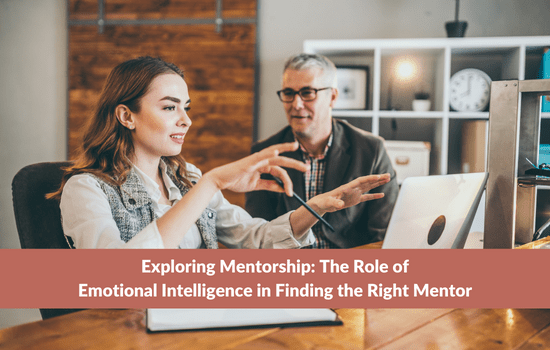Mentorship is a valuable resource for individuals seeking guidance and support as they build their career potential and life path. Emotional intelligence is the compass in navigating the journey toward finding the perfect mentor-mentee relationship.
Finding the Perfect Mentor: The Power of Emotional Intelligence

Embarking on a journey through the world of mentorship unveils a critical factor in finding the ideal guide: emotional intelligence.
What Is Mentorship?
Mentorship is a dynamic and nurturing relationship between a more experienced individual (the mentor) and a less experienced individual (the mentee) to support the mentee's personal and professional development.
Mentorship involves sharing knowledge, expertise, insights, and guidance to help the mentee navigate challenges, set goals, acquire new skills, and realize their potential. It often encompasses a range of activities, including coaching, advising, networking, and providing feedback. Mentorship relationships can vary in structure and duration but typically are characterized by mutual trust, respect, and a commitment to learning and growth.
Mentorship is a timeless concept, revered for its ability to shape careers, foster personal growth, and navigate the complexities of professional life. Yet, the quest for the right mentor goes beyond sheer professional expertise; it examines the intricate realms of emotional intelligence. Emotional intelligence helps steer the pathway toward finding the perfect mentor who imparts knowledge and fosters growth, empathy, and understanding.
Emotional Intelligence Transforms Mentorship Relationships
Emotional intelligence is paramount in mentorship. It shapes the quality of the relationship between mentor and mentee, fostering a supportive and constructive environment for growth. Many don't realize the power of emotion, which is why I write about it in my book, The Power of Emotion.
Here's why it's crucial:
- Empathy and Understanding - Emotional intelligence allows mentors to empathize with their mentees, understanding their challenges, fears, and aspirations on a deeper level. This empathy enables mentors to provide tailored guidance and support that resonates with the mentee's unique circumstances.
- Effective Communication - Mentors with high emotional intelligence can communicate effectively, impart knowledge, listen actively, and provide constructive feedback. They can adapt their communication style to suit the mentee's preferences and learning needs, enhancing the effectiveness of the mentorship relationship.
- Building Trust - Trust is the cornerstone of any successful mentorship. Emotional intelligence enables mentors to build trust by demonstrating authenticity, integrity, and reliability. Mentees are more likely to trust their mentor's guidance and advice when they feel understood, respected, and supported.
- Conflict Resolution - Inevitably, conflicts may arise in mentorship relationships. Emotional intelligence equips mentors with the skills to navigate conflicts constructively, addressing issues with empathy, patience, and respect. By resolving conflicts effectively, mentors can strengthen the bond with their mentees and foster a more resilient relationship.
- Personal Growth - Mentees with high emotional intelligence can benefit immensely from mentorship, as they can better process feedback, adapt to change, and manage their emotions. Emotional intelligence enables mentees to approach challenges with resilience, learn from setbacks, and cultivate a growth mindset essential for their development.
The Intricate Dance Between Emotional Intelligence and Mentorship
The intricate dance between emotional intelligence and mentorship is multifaceted and dynamic. Emotional intelligence allows mentors and mentees to understand and navigate the complexities of human interactions, fostering trust, empathy, and mutual respect. A mentor with high emotional intelligence can empathize with their mentee's struggles, provide constructive feedback, and offer support tailored to their needs. Similarly, mentees with strong emotional intelligence can effectively communicate their goals, seek guidance, and adapt to input with resilience and openness. This symbiotic relationship is built on a foundation of trust, authenticity, and emotional connection, enabling both parties to thrive personally and professionally.
10 Steps to Finding the Ideal Mentor
Here are some strategies to help you find the right mentor:
- Self-Reflection,
- Identify Potential Mentors,
- Networking Events,
- Explore Online Platforms,
- Seek Recommendations,
- Request Informational Interviews,
- Attend Workshops or Seminars,
- Join Mentorship Programs,
- Be Proactive, and;
- Cultivate Genuine Relationships.
By leveraging these strategies, you can identify and establish meaningful mentorship relationships that support your professional development and personal growth.
Without question, emotional intelligence strengthens the mentorship process, guiding each step of the path toward growth, development, and success. By harnessing emotional intelligence, mentors and mentees can create transformative relationships that inspire growth, learning, and mutual success.
Marshall Connects offers EI assessments and coaching to enhance relationship and skill development in all areas, including mentorship development for mentors and mentees. If you want to improve your emotional intelligence, consider taking a self-assessment to provide a personal analysis of your perception of your behaviour.
More Motivational Reads Here »
How Emotionally Intelligent Are You?
Sign up for Linda’s monthly tips to build your Emotional Intelligence and reduce Emotional Hijacking!

















